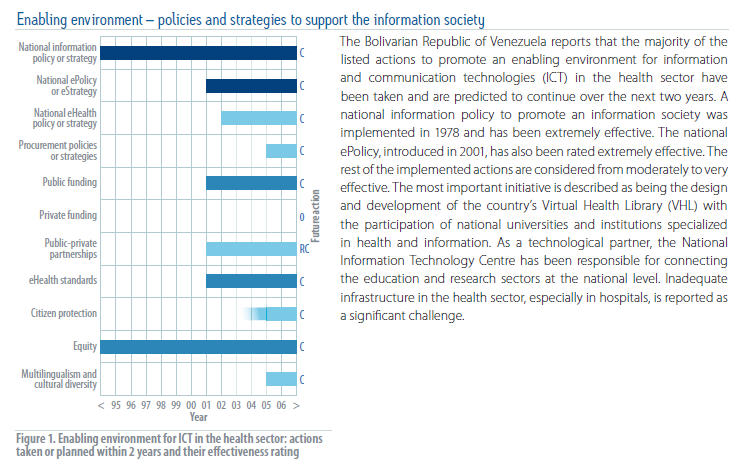

|
» Country
Overview
****************************
|
|
►Government Interference ■ Positive Results ■ Local Internet Traffic ■ Enabling Environment ◄ Venezuela remains a difficult environment for business, with the government taking continued interest in the telecoms market. In 2007, President Hugo Chavez's government bought a controlling stake in the largest Venezuelan telecommunications company as it moved ahead with its nationalization drive. Venezuela's Chavez, who is criticized by media freedom groups, called on Saturday (March 13, 2010) for regulation of the Internet and singled out a website that he said falsely reported the murder of one of his ministers. "The Internet cannot be something open where anything is said and done. Every country has to apply its own rules and norms," Chavez said. He cited German Chancellor Angel Merkel as having expressed a similar sentiment recently. Chavez is angry with Venezuelan political opinion and gossip website Noticierodigital, which he said had falsely written that Diosdado Cabello, a senior minister and close aide, had been assassinated. The president said the story remained on the site for two days. The government has also put pressure on opposition TV network Globovision to soften its editorial line and last year closed dozens of radio stations for administrative breaches. An announcement in January 2010, devaluing the currency highlights just one area in which government intervention is affecting operators. The largest fixed-line and mobile operators, CompaA[+ or -]A-a AnA[sup.3]nima Nacional TelA[c]fonos de Venezuela (CANTV) and Movilnet, are government owned and follow the state's staunchly socialist regime. Despite heavy investment from CANTV into fixed-line services, this sector continues to see slower growth. Social networking web sites like Twitter and Facebook are very popular among Venezuela's opposition movements to organize protests against the government. Chavez has complained that people use such sites to spread unfounded rumors. Many opponents fear Chavez plans to emulate the government oversight of the Web used by allies Cuba, China and Iran, but the socialist leader has not given any sign that he is planning such a move. In 2007 Chavez refused to renew the license for television station RCTV, which is now battling to survive as a cable-only operator. The government's interference in the market has not been all negative, with a strong focus on ensuring network infrastructure is extended to more remote areas of the country as well as offering incentives for low-income households to acquire computers and broadband services. Local Internet Traffic in Venezuela Venezuela is one of the few countries in the region that has not succeeded in implementing plans for the creation of a NAP. The creation of network access points (NAPs), also know as Internet Exchange Point (IXPs), was identified as a means of remedying the problem related to internet traffic and the broadband market emerged and was recognized as hindering the quality of communications in South American countries: the long distance that most internet traffic had to travel outside of the region and then back again, even in the case of local communications. By facilitating the exchange of internet data traffic within a particular geographic area (a country or region), it would be possible to avoid channeling traffic through international routes when there was no need for it to leave the area. The academic, private and state sectors have all promoted the creation of shared points of internet connection, for reasons that have varied over time: from scientific necessity to economic benefit to technological independence and sovereignty. And all have proven unsuccessful. It is generally assumed that the creation of national and regional NAPs will not only improve the quality of internet access in the countries of Latin America, in terms of connection speed and reliability, but will also contribute to lowering the costs of service by eliminating expenditures on international service providers More recently, the new initiative for the creation of a NAP promoted by the state is tainted by the politically polarized climate currently gripping Venezuela. Mistrust, conflicting priorities, power relations and fear of excessive control by the state have thrown up new obstacles to negotiations for the creation of a NAP. At the same time, however, the unsuccessful efforts to create a NAP in Venezuela over the course of an entire decade raise the question of whether new technological developments might not offer solutions for the initial goals to be fulfilled through a NAP: greater efficiency and lower prices for end-users. Thanks to the emergence of new technologies, the convergence of services and decreases in international connectivity prices, it is quite likely that at this point in time the creation of a NAP is losing the relevance it had in earlier years. The resurgence of the idea of a NAP in Venezuela, promoted by the government and based on a strategic conception of the sector, has complicated negotiations by lending the initiative new connotations. A new relationship between the state and the telecommunications sector is developing, one that is not only economic but also political. Over the last decade, the internet has become a powerful tool and its capacity to influence diverse sectors of society has made it a major force in this new century. Along the way, both the state and society, in their complex interrelationship, are putting their cards on the table, making offers, exerting pressure, in accordance with the difficult expectations developed in this 21st century. New contexts, new forms of negotiation.
|
